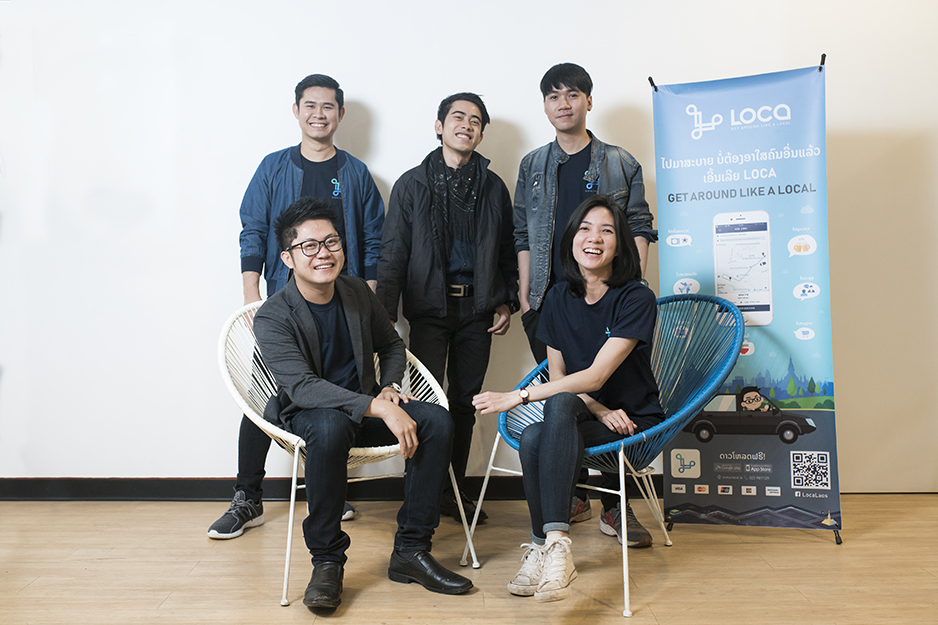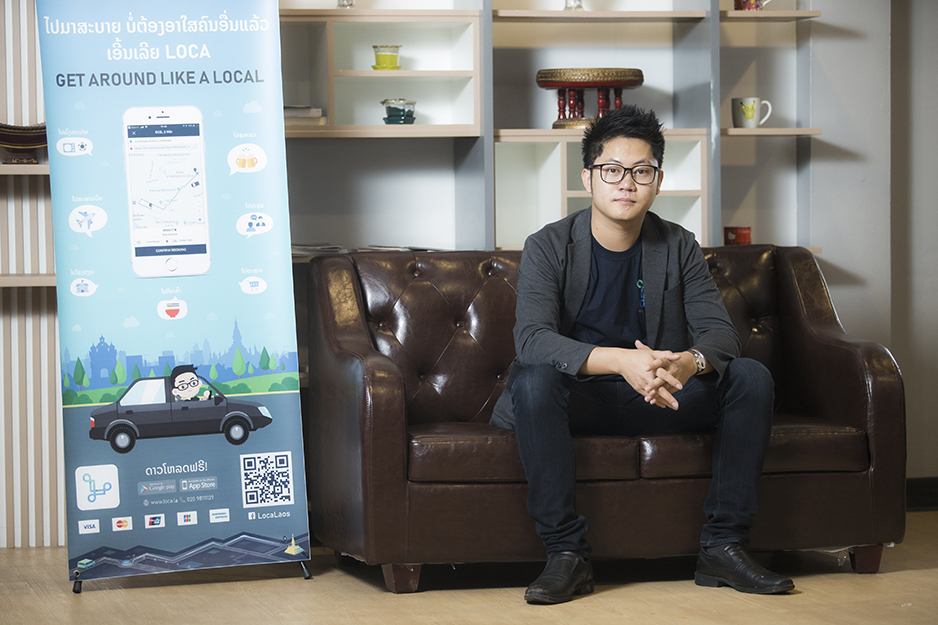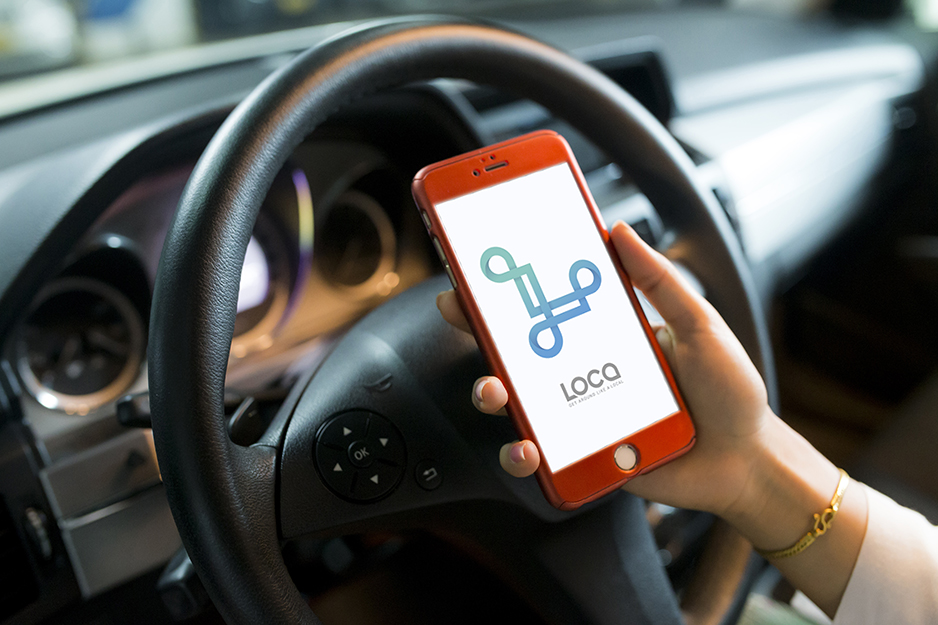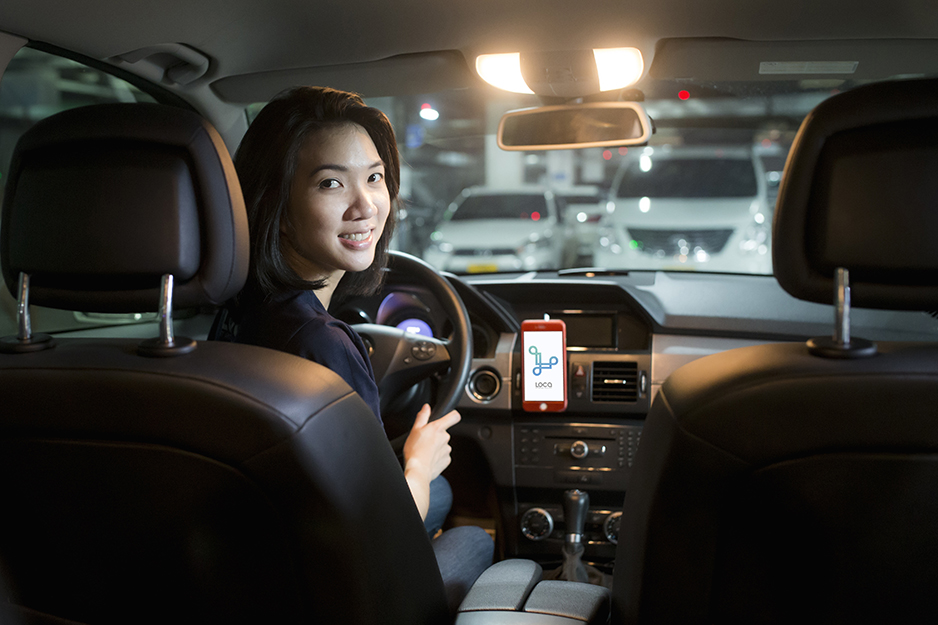Ride-sharing app LOCA helps you get around like a LOCAL.
Not surprisingly, to make my way over to LOCA headquarters for this story, I downloaded and installed the LOCA app. A vehicle was sent to my office to pick me up, and I tracked its progress on my mobile phone until a small, unassuming hatchback pulled neatly up against the curb. A message appeared on my screen; “I am here.” I hopped in the front seat and was greeted with a shy smile from Pui, my designated driver for the trip.
Pui says most of her passengers are foreigners already familiar with the ride-sharing concept. They are often business travelers visiting the city for the first time, taking a LOCA trip from meeting to meeting. She is one of the few full-time LOCA drivers who works Monday to Friday.

“My family has no idea what I’m doing. They don’t understand exactly what LOCA is. But they are happy that I’m working,” she says, noting that before LOCA she was unemployed.
“I worked as a delivery driver a few years ago. I liked the freedom it gave me, so I thought I’d try this. I get to be my own boss and I meet a lot of new people.”
With over 900,000 vehicles on the road and no viable public transport system insight, traffic in Vientiane is becoming a thing. A thing mentioned in casual conversation, a thing appearing in news reports, and a thing to be battled during the daily commute. Roads are small, cars are big, and people still double park to buy a bunch of bananas. It’s no wonder, then, that local tech firm Bizgital put their heads together and came up with a solution.
Arriving at the Bizgital building, I input a special promo code and find 80,000 kip sitting in my LOCA virtual wallet. The trip cost 25,000 kip, leaving me with some extra credit. Pui waits for her next passenger, and I head up the stairs to meet Souliyo Vongdala, Chief Technology Officer at Bizgital, and the man behind the LOCA ride-sharing app.
It took six months for the team to draft the driver registration procedures, and Souliyo assures me that all drivers are thoroughly screened. They are provided a training video, and their first few rides are monitored to ensure they adhere to LOCA’s internal safety regulations.
“We have systems in place to minimize safety risks, although we can’t be there for every trip. If a vehicle’s insurance policy expires, for example, that vehicle will be automatically suspended until a new insurance policy is taken out.”
Cash payment was out initially, says Souliyo, but it was brought back in at a later stage due to high demand. And the problem of cash management turned out to be an opportunity.
“If you complete a trip that’s worth 50,000, you can give the driver a 100,000 kip note and ask them to deposit the remainder into your LOCA virtual wallet. That way you’ll have 50,000 kip in your account to use for future trips. The system automatically manages this.”
Drivers are paid weekly, and can choose their own working hours. However, being an entirely new concept, many drivers are apprehensive at first, unsure if they will turn a profit. To combat this, LOCA is investing heavily by setting guaranteed payments for drivers in case they don’t get enough traffic.
The dearth of public transportation is one of the reasons the LOCA app was created. But Souliyo sees more opportunities for his application with corporate clients, who can now send employees around town without the use of private vehicles.

“Your company will have access to a back end system, and you can add employees into your account. LOCA will bill you for trips at the end of the month. Not only will you know how much it has costs, but also where your staff have been. It’s fair for both sides.”
When asked if he’s worried about competition from taxis, Souliyo smiles. He knows that LOCA is cheaper than a taxi, and easier to find. And it eliminates discrimination against tourists, who are often charged double by devious taxi drivers.
The application now has over two thousand registrants, including over fifty drivers. But surprisingly, the biggest request from local people so far has been an extension of the app to include motorbike taxis. And LOCA is working with insurance agencies to make this happen.
“Even me, I want to take a motorbike taxi because it will be cheaper and faster during peak hours,” says Souliyo.
LOCA trips can be paid for with Visa or MasterCard, as well as cash, and the developers are working with local finance institutions to bring QR code payments online. So the future looks bright for LOCA, which plans to expand to every major city in Laos within the next few years.
When asked about the name of the app, Souliyo gives another knowing smile, and says that all the proposed names were thoroughly researched.

Text by: CAMERON DARKE
Photographs by: PHOONSAB THEVONGSA



 ລາວ
ລາວ
